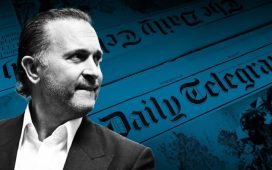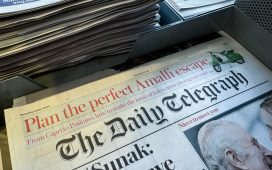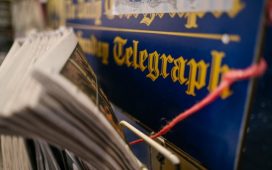Alan Yentob, who has died aged 78, was one of the very few figures in British TV to have seen his name prominently featured in the closing credits of shows as producer-director, on the opening ones captioned “presented by” and on the oaken doors of offices on the BBC management floor.
Cracked Actor, a documentary about David Bowie that Yentob made in 1975 for BBC One’s Omnibus, dealt with complex issues of identity and addiction around a still-emerging star at a time when cultural programming was happier with the classical dead. Yentob’s spell as editor of BBC Two’s Arena, from 1978-85, influentially established that the remit of an arts show could include the Ford Cortina car.
As controller of BBC Two from 1987 (before taking the same post at BBC One in 1993), he introduced shows including Absolutely Fabulous and Have I Got News For You, in the first of a series of executive positions. Interviewed for, but not appointed to, the top BBC job of director general, Yentob re-invented himself as a TV presenter, fronting BBC One’s Imagine, an intended rival to The South Bank Show on ITV (later on Sky) under Melvyn Bragg, with whom Yentob maintained a rivalry of the broadcast arts supremos.
One of the many director generals he served, pressed at a dinner party on whether Yentob didn’t perhaps have too much influence off and on screen, protested: “But Alan is the BBC!” And, though that perception helped him at the highest levels of the corporation, it could create resentment among lower employees and in the politics of television and Westminster.
In all his roles, he was creative, enthusiastic, curious about the next big thing and significantly well-connected, with a tendency towards first-name, big-name anecdotes. “Salman” was a fairly easy code to crack but, with “Mel”, there could be confusion over whether he meant Brooks or Giedroyc, and junior employees would boggle when a casually mentioned “David” turned out to be Bowie. As often with Yentob, though, the gags about his contacts book were complicated. He did not pretend to these connections, only having these names to drop because he had really picked them up. It must have been a poignancy to both of them that Mel Brooks, a great friend, has, at 98, outlived the much younger man.
And, although Imagine was known to detractors inside Broadcasting House as “Al’s Pals”, it was striking that, in the final years of the show – when production was threatened first by funding cuts and then Yentob’s failing health – those who agreed to be profiled included those he had encouraged in his executive roles: including French & Saunders and Armando Iannucci. (Yentob had recently been working on a profile of the artist Jenny Saville.)
Yentob’s pursuit of high BBC power and an on-screen career were something of a surprise to those who had first known him as a somewhat scruffy and chaotic programme-maker. A tendency to be over-stretched in administrative matters limited his BBC management ambitions and caused controversy inside and outside the BBC when his 14-year stewardship (as trustee and chair) of the charity Kids Company was criticised by the official receiver and the House of Commons public accounts committee. That led to his resignation in 2015 – due to fears of conflict of interest over BBC editorial content – from a final executive role as BBC creative director. (Yentob, though, successfully challenged in court a ban on holding directorships.)
Apart from Bragg, the broadcaster whose career Yentob most closely shadowed was David Attenborough, who had also been a BBC director of programmes before moving in front of the camera, and seemed to be Yentob’s model for his own career.
Crucially, though, the naturalist, after moving from management, operated as a presenter-writer for hire. Yentob, while presenting Imagine, was also employed and credited as series editor and continued to hold other BBC executive positions until they were eventually denied to him. Even after that, he unwisely confided in an interview that he could walk into the DG’s office whenever he wanted. This unusual continuity of power could lead to concerns from other BBC arts programmes and presenters that Yentob had privileged influence over subjects and budgets.
The fairest summation of his work might be that in each phase of his broadcasting career – as arts show producer, programming controller and then presenter – Yentob was responsible for shows that no one else could have made at the BBC. Arena: The Private Life of the Ford Cortina changed the scope and tone of arts broadcasting for ever. Many other commissioners before or since might have said no to Absolutely Fabulous. But Imagine could sometimes feel like a long-service medal to a member of the managers’ magic circle.
Having moved in front of the camera, Yentob became recognisable enough to earn cameos in popular culture. He relished those in which he appeared on his own terms – such as a cutaway to him arm-wrestling with “Salman” in a BBC side-office in the sitcom W1A – but less so external dramatisations: in Committee (2017), an operetta based on the parliamentary hearings into the Kids Company scandal, his role was sung by Omar Ebrahim, whose numbers included a name-dropping aria.









